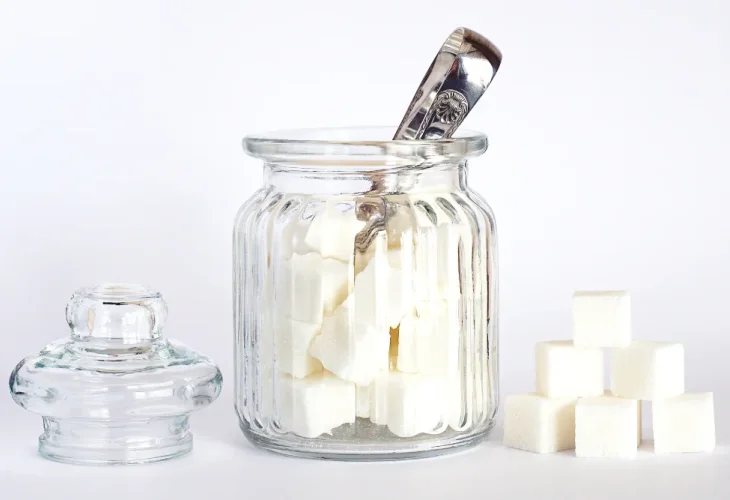Health and Nutrition
Life Without Sugar: How Cutting Sugar Transforms Your Body and Mind
Discover the Benefits, Challenges, and Healthy Alternatives of a No-Sugar Diet for Energy, Skin, and Long-Term Health

If you're thinking about quitting processed sugar, you're not alone. As awareness grows, more people are experimenting with sugar-free lifestyles, hoping to improve their health, lose weight, or simply feel better. Sugar is almost in everything we eat, including bread, sauces, drinks, and even foods we think are “healthy”.
If you're wondering why you should reduce your sugar intake, these are some compelling reasons:
Weight Loss: Sugar is a source of “empty” calories—it gives you quick energy but provides no real nutritional value. Natural foods like fruit contain sugar too, but they also come packed with fiber, vitamins, and minerals. Refined sugars, whether white or brown, don’t offer these benefits.
Clearer Skin: Many people who stop eating sugar report that their skin becomes smoother, less irritated, and glows more. That’s because sugar can trigger inflammation in the body, which may lead to acne and other skin conditions. Reducing sugar can also slow skin aging.
Stable Energy Levels: Sugar breaks down quickly, causing a spike in blood sugar followed by a crash. This rollercoaster leaves you tired, foggy, and often craving more sugar. Eliminating sugar helps stabilize your energy throughout the day.
Better Overall Health: Excessive sugar intake is linked to heart disease, diabetes, obesity, and weakened immunity. Cutting back is one of the best things you can do for long-term wellness.
The First Week – Tough but Temporary
Each person reacts differently, but the first week after quitting sugar is often the hardest. Your body may push back after being dependent on regular sugar hits.
1. Headaches and Irritability
Your brain craves dopamine and sugar triggers its release. Without it, you may feel grumpy or experience headaches. This is normal and usually fades after a few days.
2. Strong Cravings
Around day 3 or 4, you may find yourself fantasizing about desserts. Hang in there, the cravings will fade, especially if you find healthy replacements.
3. Fatigue
Initially, your energy might dip because your body is adjusting to new sources of fuel like fats and proteins instead of quick sugar hits. Once adapted, you’ll feel more consistent energy.
Once you get past the adjustment period, many positive changes kick in:
1. Clearer Skin
With less inflammation, your skin can become less oily, with fewer breakouts.
2. Improved Mental Clarity
Steady blood sugar levels often lead to better focus, sharper thinking, and improved memory.
3. Better Sleep
Balanced energy during the day often translates into deeper, more restful sleep at night.
How to Make It Easier
1. Go Gradually
You don’t have to quit cold turkey. Start by eliminating sugary drinks, then move to cutting back on processed snacks.
2. Find Healthy Alternatives
Use natural, nutrient-rich sweeteners such as fruits, dates, or a touch of honey. (As Maimonides warned, even natural sugars should be used in moderation.)
3. Stay Hydrated
Water helps flush out toxins and reduce fatigue, which is especially important in the first few days.
4. Be Consistent
Like any habit change, persistence is key. The longer you stick with it, the easier and more rewarding it becomes.
Healthy Sugar Substitutes
Following are some better-for-you alternatives to white sugar:
Fresh Fruit: Dates, bananas, apples, and pears contain natural sugars and fiber, making them excellent for sweet cravings and smoothies.
Honey: Rich in antioxidants and antibacterial properties, honey is better than refined sugar but should still be used moderately.
Pure Maple Syrup: Contains antioxidants and minerals like zinc and manganese.
Stevia: A natural sweetener with no calories and no effect on blood sugar—ideal for diabetics (check with your doctor first).
Coconut Sugar: Lower glycemic index than white sugar but still to be used in moderation.
Dried Fruit: Dates, raisins, and apricots are sweet, fiber-rich, and can be used in baking.
Molasses: A byproduct of sugar processing that retains minerals like iron, calcium, and magnesium.
Agave Syrup: Has a low glycemic index but is high in fructose, so moderation is essential.
Important Note: Even natural sugar substitutes can raise blood sugar. Individuals with diabetes or those managing insulin sensitivity should consult with a healthcare provider before making dietary changes.
Disclaimer: The information provided here does not constitute professional medical advice and is not a substitute for consultation with a qualified health expert.

